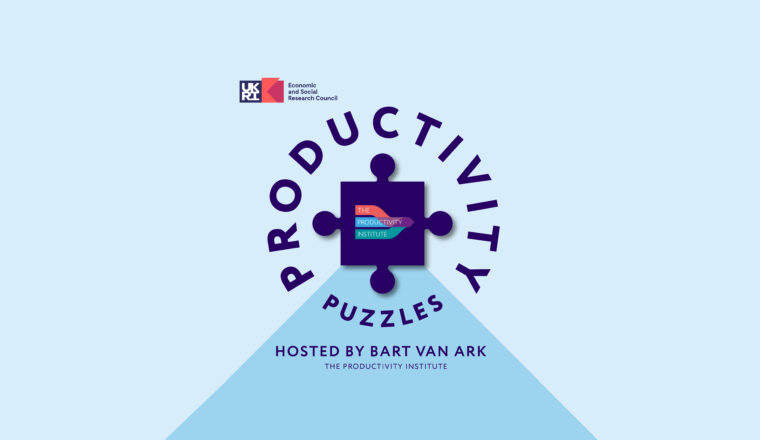Business model innovation and strategic productivity
Business model innovation is one of the key components in an organisation’s productivity. So why do so many firms struggle with it? What does it take to do it right? The latest episode of the Productivity Puzzles podcast, Business model innovation and strategic productivity, examines this problem and explores practical examples of where business model innovation has been pivotal in a business’ success, examples where companies have failed to innovate their business model, and examples of future challenges that will necessitate these changes. Hosted by Bart van Ark and featuring insights from Professor Chander Velu and Sir Charlie Mayfield, this episode is a must-listen for anyone interested in the future of business strategy.
What is business model innovation?
A business model is a strategy outlining how a business provides value to its customers. Business model innovation describes the process through which an organisation adjusts its business model. It is not just about tweaking existing strategies; it’s about fundamentally rethinking how a business creates, delivers, and captures value. This involves everything from reimagining the value proposition to reconfiguring operational processes. The episode highlights the importance of adapting business models to harness the potential of digital technologies and to navigate the transition to a net zero economy.
Why changing business models is tricky for incumbent firms
There are two principal reasons for the difficulty that incumbent firms face in innovating their business models:
- First, senior management tend to get locked into a cognitive frame with a dominant business model design that it is unable to reframe appropriately in a timely manner – the cognitive challenge. For example, Xerox’s success in the photocopying business led to lack of interest from the senior management to commercialise the inventions from its XEROX PARC lab (such as the mouse, graphical user interface and ethernet among others) as they could not directly help enhance the existing business model of the firm by speeding up photocopying.
- Second, incumbent firms tend to find it difficult to reconfigure their core activities and processes from an architectural perspective to change the business model – the reconfiguration challenge. For, example Blockbuster responded to the emergence of Netflix by launching an online version, Blockbuster.com and integrating with the physical branch-based model. Such an integrated business model increased the cost of managing the inventory and reduced revenues by the removal of late fees to be compatible with the online model of Netflix.
Opportunities for SMEs
Small and medium-sized enterprises (SMEs) face unique challenges when it comes to adopting new business models. The episode explores the resource constraints and the need for external support that SMEs often encounter. Despite these challenges, business model innovation offers significant opportunities for SMEs to enhance their competitiveness and sustainability.

Examples of successful business model innovation
The podcast provides several real-world examples of companies that have successfully innovated their business models. The guests discuss low-cost airlines like Ryanair and EasyJet, which disrupted the aviation industry by creating new markets. Charlie Mayfield shares his experience with the John Lewis Partnership with transitioning from an analogue to an online multichannel organisation. Additionally, the use of digital technologies and AI by companies like Caterpillar and Uber demonstrates how innovation can transform traditional business models.
The role of digital technology
Digital transformation is a recurring theme throughout the episode. While the adoption of digital technologies is essential, it is enough to achieve significant productivity gains. Companies must move beyond digitisation to fully leverage the benefits of digital technologies in their business models. This is especially important in the context of sustainability and the transition to a net-zero economy.
The net zero transition means fundamental changes in how products and services are delivered to reduce carbon emissions and environmental impact. Business model innovation can create new value propositions that align with sustainability goals. This requires both technological advancements and significant changes in consumer behaviour and organisational practices. Business model innovation can facilitate these changes by integrating new technologies and fostering a culture of sustainability within organisations.

About the guests
- Professor Chander Velu: Professor of Innovation and Economics at the Institute for Manufacturing, University of Cambridge. Chander has written extensively on business model innovation and its impact on productivity, including a new book.
- Sir Charlie Mayfield: Former Executive Chair of the John Lewis Partnership, Founder and Chair of Be the Business and Chair of QA Limited. Charlie brings a wealth of experience in business strategy and digital transformation.
Find out more
- Listen to Business model innovation and strategic productivity, an episode of Productivity Puzzles featuring Chander Velu and Sir Charlie Mayfield.
- Read Business Model Innovation: a critical enabler of productivity improvements, a blog for The Productivity Institute by Chander Velu.
- Read Business Model Innovation: A Blueprint for Strategic Change, by Chander Velu.
- Read The strategy behind one of the most successful labs in the world, an article in Nature by Luka Gebel, Chander Velu and Antonio Vidal-Puig.
- Listen to Business Dynamism: is turbulence good for productivity?, an episode of Productivity Puzzles featuring Rebecca Riley, John Van Reenen and Javier Miranda.
- Listen to Government policy and business productivity: does it help or harm?, an episode of Productivity Puzzles featuring Stephen Roper, Jane Galsworthy and Tera Allas.
- Listen to How do business leaders think about productivity?, an episode of Productivity Puzzles featuring Katy Davies, Lou Cordwell and Gregory McDonald.



